On October 30th at 6:00pm – Smart Chicago will be live streaming the OpenGov Chicago meetup where we’ll review the City’s Technology Plan below:
Month: October 2013
On the Creation of the U.S. Open Data Institute
Today in London, Waldo Jaquith, a great colleague and fellow Champion of Change, announced the launch of the U.S. Open Data Institute. The goal is “to encourage governments and businesses to adopt open data standards as a way to promote economic growth, innovation and social change”.
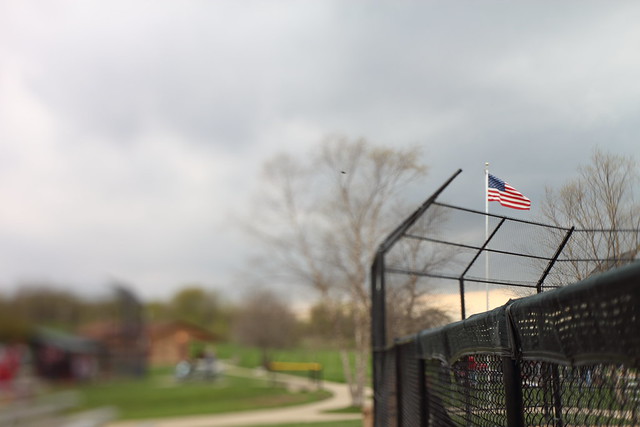
Remarks to the Cook County Finance Committee in Support of the Cook County Bureau of Technology FY2014 Budget
This morning, along with a couple dozen other people, I spoke during the public comment section of the Cook County Board Finance Committee. The comments are limited to three minutes per person, and I covered my support for the technology portion of the Cook County Finance & Administration budget. I spoke in my capacity as co-chair of President Preckwinkle’s New Media Council, but the cool thing is that anybody can sign up to speak at these sessions. Here’s the full text:
Good morning Mr. Chairman and Commissioners. My name is Daniel X. O’Neil, and I am the Executive Director of the Smart Chicago Collaborative, a civic organization devoted to improved lives in Chicago through technology. Our founding partners are the City of Chicago, the MacArthur Foundation, and The Chicago Community Trust.
We also work very closely with the State of Illinois and the great County of Cook in order to do our work. I’ve interacted with a number of the members of this body in the course of my service at Smart Chicago and in my efforts in the open data movement. I very much appreciate the time I’ve spent with some of you, and I’d like to work with each of you on these matters.
I also serve, along with my friend and colleague Blagica Bottigliero, as co-chair of President Preckwinkle’s New Media Council, where we are charged helping the County develop a digital strategy to better engage, serve, and connect with the public.
In that capacity, I’ve come to greatly value the leadership of Cook County Chief Information Officer Lydia Murray. She is a clear thinker with a practical approach to solving the long-festering technology issues facing County government.
I appreciate the focus on reducing waste to save taxpayers’ money, the spirit of collaboration with the City of Chicago, the sound investments in improving Internet connectivity, and the attention paid in this budget to the baseline applications that make core County functions run.
I’m excited about the public website redesign project. The planned features of responsive design and a focus on the mobile experience can allow the County to make a giant leap in communication with the public.
The investments in core systems like the Criminal Justice Data Sharing System, revenue collection, and case management will lead to better service for the public.
I am especially looking forward to the planned improvements in the transparency, efficiency and accessibility of the County’s property tax system. That is sorely needed and long delayed.
I strongly urge you to support the Fiscal Year 2014 Budget of the Cook County Bureau of Technology. Thank you for your time.
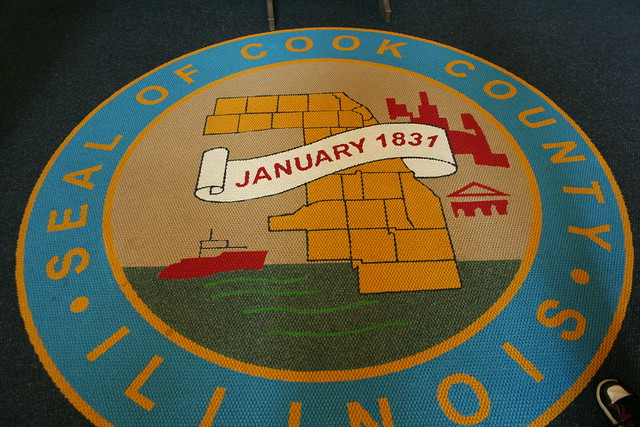
Health Datapalooza: Deep dive into health data
In preparation for the Illinois Health Datapalooza, we wanted to take a deep dive into the different kinds of health data already available to developers at the state, local, and federal level. A big part of the datapalooza will be determine what we can do with health data.
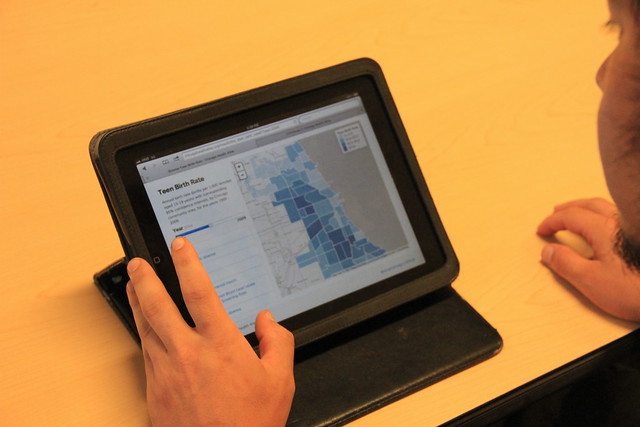
Healthdata.gov
Healthdata.gov is the federal health portal run by the US Department of Health and Human Services. The federal government plays an outsized role in the healthcare field in part by managing Medicare and Medicaide. When a patient received a medical treatment and the federal government pays for it, HHS collects that data. They’ve released this dataset (Inpatient Prospective Payment System (IPPS) Provider Summary) to show the vast variation in cost between different service providers. This particular data set has a well documented API to show how the data was constructed and what each field means.
There are also datasets that get deep into the minutiae of the day to day operations of the health care system. RxNorm is a query tool that’s used to provide normalized names for different pharmacy management systems. (So that if one pharmacy system calls it one name, you can quickly determine it’s name in another system.)
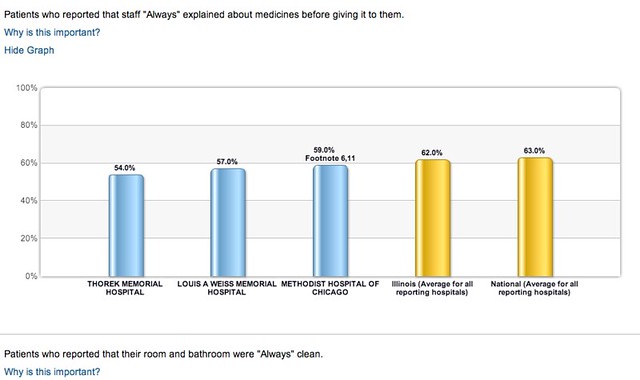
Healthdata.gov also provides the raw data that powers the Medicare Hospital Comparison tool. The tool allows patients to look for the best hospitals possible.
The healthdata.gov site continues to expand it’s offers and will be a great resource for developers, data scientists, and researchers going into the future.
Data.Illinois.Gov
The state’s data portal has 60 different datasets relating to health care. Many of these datasets are directories for different services such as hospitals, hospice care, and rural health centers.
Other datasets include interesting historical health information such as infant mortality rates from 1907 to 2008, divorce rates from 1958-2009, and births by county in 2009.
Data.CookCountyIl.Gov
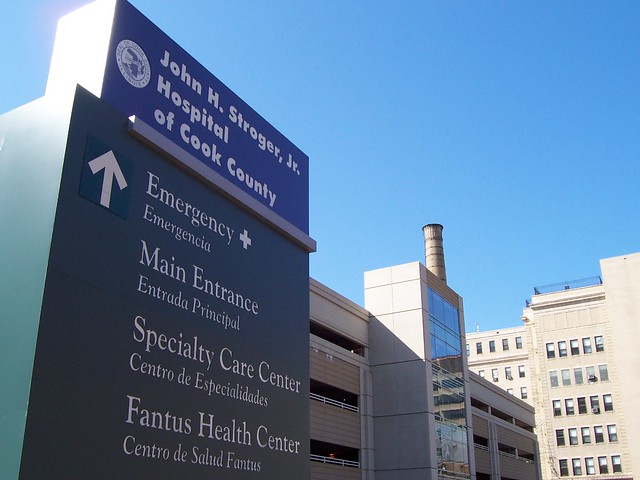
The Cook County data portal has a number of datasets that stem from their administration of the Cook County Health and Hospital System. For example, the county has data about the cost of services for those detailed by the Cook County Sheriff’s Office, causes of death in 2009, and Cook County Vaccination Partners.
Data.CityofChicago.org

The City of Chicago data portal also has several datasets that have health care implications. They include location-based data such as warming center locations, substance abuse treatment facilities, and flu shot locations.
The city also has a number of datasets about the prevalence of health conditions within the city. Many of these datasets, such as diabetes hospitalizations, asthma hospitalizations, and low-birth rates, are used to power the Chicago Health Atlas.
What’s NOT on the portals
Admittedly, there is not enough open data available on the various portals to be as innovative as our public health sector needs to be. Part of the mission of the Health Data Consortium is to foster the availability of health data and to build an ecosystem of health care innovation. So, in addition to talking about data that’s already available, the datapalooza is a perfect opportunity to talk about data not currently available.
There are still slots available for both days. You can find the registration link for the November 8th event here and the November 9th event here.
Two Great Illinois-Focused Health Data Events
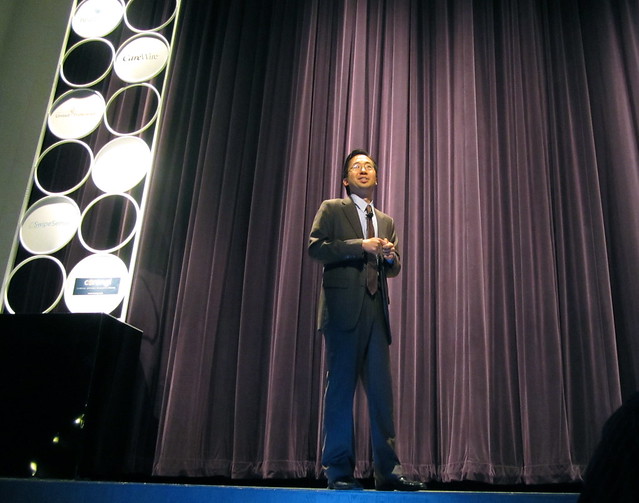
U.S. CTO Todd Park at Healthbox Investor Day here in Chicago
There are two great statewide health data events coming up on November 8 and 9 in Chicago.
Putting Health Data to Work in Our States and Communities
First up, on Friday, November 8, is A Health Data Consortium Event: Putting Health Data to Work in Our States and Communities.
The event is organized in partnership with the Health Data Consortium, the State of Illinois, the California HealthCare Foundation, and Robert Wood Johnson Foundation. It’s a gathering of thought leaders from the private, nonprofit, and government sectors confronting the most pressing health data issues in the U.S. health care system at the state and local level.
The day-long event will be the first of a series of Health Data Consortium forums focusing on state and local health data successes, challenges, and opportunities. Invited speakers for the event include:
- Pat Quinn, Governor of Illinois
- Todd Park, U.S. Chief Technology Officer
- Bryan Sivak, U.S. Department of Health and Human Services Chief Technology Officer
- Dr. LaMar Hasbrouck, Director, Illinois Department of Public Health
More speakers and panelists to be announced. Register here for the event on November 8.
Illinois Health Datapalooza
The next day, Smart Chicago will be helping host the Illinois Health Datapalooza on November 9th at 1871. The datapalooza brings policy makers, health care practitioners, web developers, designers, and data scientists to find ways to make health data a deeper part of the technology scene Illinois.
The event is organized by the Health Data Consortium, the US Department of Health and Human Services, the Illinois Department of Public Health (IDPH), the Illinois Department of Commerce and Economic Opportunity (DCEO) and the Smart Chicago Collaborative.
Christopher Whitaker, consultant and writer for Smart Chicago, has done lots to prepare for this event and will help guide the activities.
The morning sessions will be skill-sharing roundtables with representatives from Socrata, ESRI, and Healthdata.gov on hand to talk about available tools and resources for working with open health data. Midday activities will include brainstorming sessions on current challenges that healthcare policy makers and practitioners have in the field and an exploration into how civic innovation could help address them. The afternoon will feature unconference sessions (where attendees will can propose sessions on anything, from the new healthcare.gov to using Twitter to idenfity flu trends.)
Register for the event November 9th event here.

Lots of work to be done
We’ve talked a lot about the value of civic partnerships have in creating healthier cities and how Chicago has been producing an impressive number of health related civic apps. However, given the scope of the health care issue at both the local and national levels there is much more work to be done.
For the past few years, the Health Data Consortium (A coalition of governments, academics, and health care providers formed to liberate health data) have hosted Datapaloozas to find innovative ways to use health data. To date, these events have always been held in Washington DC. This event will be the first of a series of regional gatherings that will bring the focus of health data to the state and local level.
There is an immense opportunity to harness health data into civic startups, to find ways to improve service delivery, and to use predictive analytics to help prevent disease. What’s needed is collaboration between civic technologists and health care practitioners.
We’ll hope you join us.
Discover civic apps and civic innovators with opengovhacknight.org
Derek Eder, Eric van Zanten, and Juan-Pablo Valez recently launched Chicago’s OpenGov Hack Night website, a great resource for some of the events, projects, and people that make up the thriving civic technology scene in Chicago. Here’s a look at what the site does:

Home Page
The home page gives an overview of Open Gov Hack Night (“Come join a group of passionate folks working at the intersection of open government, cities, and technology. This is an evening of civic tech hacking, learning, and hanging.”) . It also has info on how the nights are run, sponsors, their monthly joint event with Data Potluck. They also link to similar events in other cities, some of which are simply simpatico (like those held in London by opengov pioneer MySociety) and some in the Code for America Brigade family that are completely inspired by the Open Gov Hack Night model pioneered here in Chicago.
One of the great things about the event is that it is held every week at the same time and the same place– 6PM on Tuesdays in the IMSA Classroom of 1871 on the 12th floor of the the Merchandise Mart. The format is also the same every week (intros, presentation, projects, and then hack). These reliable patterns has helped make the events popular, fun, and productive.
The three mainstays of Open Gov Hack Night are Derek Eder, Juan-Pablo Velez (two thirds of the leadership of Open City Apps and the creators of the event) and Christopher Whitaker, who leads an onboarding session called Civic Hacking 101. Christopher also livestreams each session and writes up a blog post in his capacity as a consultant for Smart Chicago.
Events Page
The event page has a brief description of recent hack nights as pulled from the Mthe emails they’ve sent out via Mailchimp and edited to include info on sponsors, links to blog posts, and so on. The first event held at 1871 was on May 17, 2012, when Derek first set up his consultancy, DataMade, in one of the Smart Chicago seat at 1871. Prior to being founding tenants of 1871, we made the following callout:
We have two reserved seats at 1871 and we seek to fill them with small companies, civic leaders, and community members who are interested in building software using city, county, and state data to improve lives and build businesses.
*
If you’re interested, complete this simple form to initiate the process. We expect to be in the space on May 1, 2012, and we’ll manage the schedule for our two seats with a Google calendar.
Derek has put that seat to great use in moving Open Gov Hack Night to 1871 shortly after he moved in. He and DataMade have their own spaces at 1871 now and we house other civic innovators there in the six seats we maintain. We’re really happy to have played a small role in the success of this event.
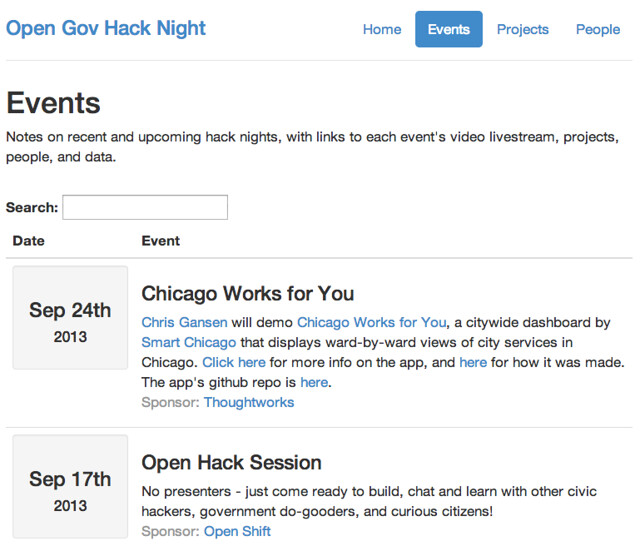
Projects Page
The Projects page is a great new way for civic innovators to find out what’s going on with projects and see what code is hot.
The uses a Civic JSON Worker that uses the GitHub API to glean information from the project’s repository. The site automatically updates the gallery as the project continues to progress. The only thing a user needs to do to contribute a project to the gallery is to copy and paste the link to the project’s GitHub page. The Civic JSON worker does all the rest!
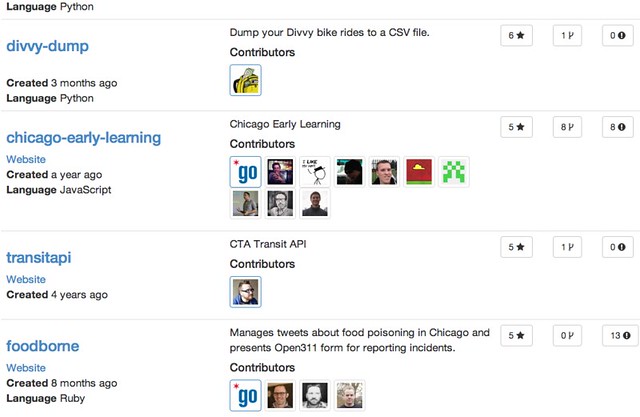
People Page
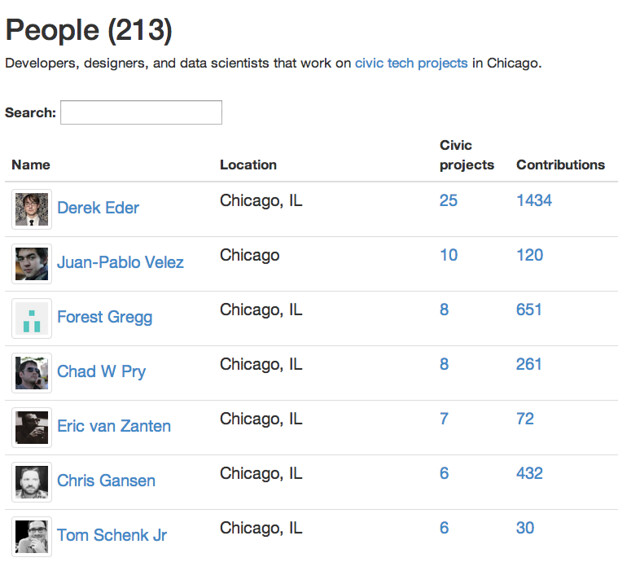
The most important aspect of the new service is that the site instantly connects you to the people behind the projects. This information from the projects is aggregated into a People tab that shows how many GitHub commits that an individual developer has contributed to Chicago civic apps. While the score isn’t that important, what is important is that community members from civic organizations who are interested in civic innovation can now directly connect with the people in the movement.
This app is also open sourced and can be used by other civic hacking communities as well. (Pull Requests Welcome!)
